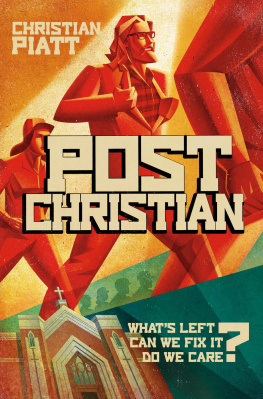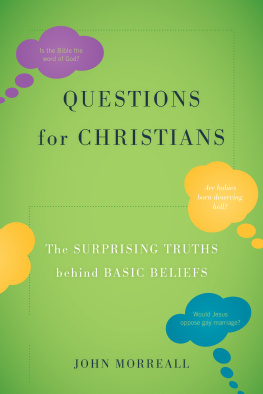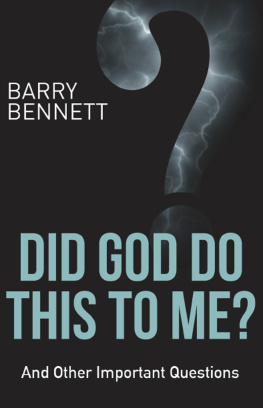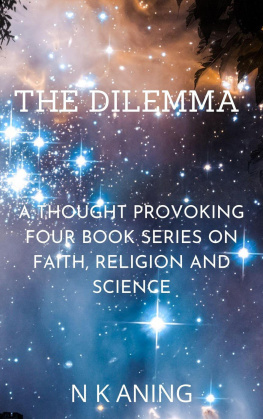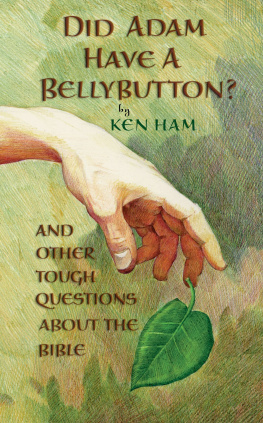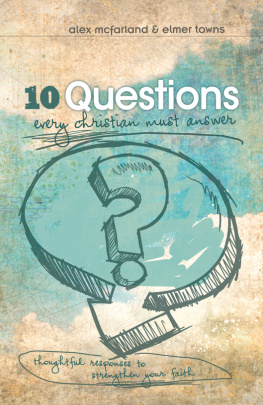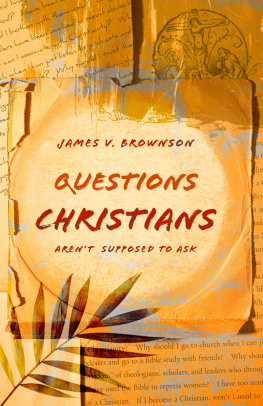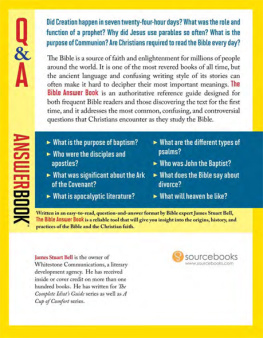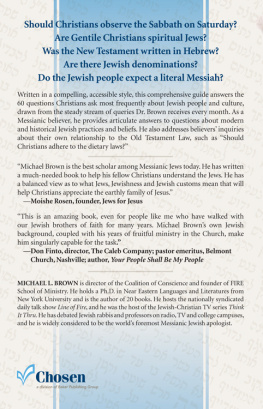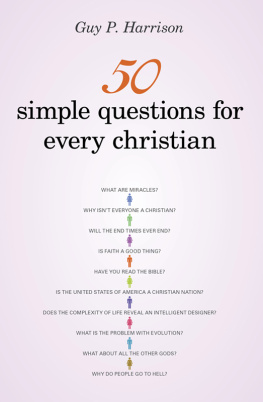
CHRISTIAN PIATT
with Matthew Paul turner,
Carol howard Merritt, Doug Pagitt and
others not afraid of impertinent questions

Copyright 2013 by Chalice Press.
All rights reserved. For permission to reuse content, please contact Copyright Clearance Center, 222 Rosewood Drive, Danvers, MA 01923, (978) 750-8400, www.copyright.com.
Bible quotations marked NRSV are from the New Revised Standard Version Bible, copyright 1989, Division of Christian Education of the National Council of the Churches of Christ in the United States of America. Used by permission. All rights reserved.
Scripture quotations marked (NIV) are taken from the HOLY BIBLE, NEW INTERNATIONAL VERSION. NIV. Copyright 1973, 1978, 1984 by International Bible Society. Used by permission of Zondervan Publishing House. All rights reserved.
Scripture marked NASB is taken from the NEW AMERICAN STANDARD BIBLE , Copyright The Lockman Foundation 1960, 1962, 1963, 1968, 1971, 1972, 1973, 1975, 1977, 1995. Used by permission.
Scripture quotations marked CEB are from The Common English Bible 2011 Common English Bible. Used by permission. All rights reserved.
Scripture quotations marked ESV are from The Holy Bible, English Standard Version. Copyright 2001 by Crossway Bibles, a division of Good News Publishers. Used by permission. All rights reserved.
Cover image: iStockPhoto
Cover and interior design: Scribe Inc.
Visit www.chalicepress.com
10 9 8 7 6 5 4 3 2 1 13 14 15 15 17 18 19 20
Print: 9780827202870 EPUB:9780827202887 EPDF:9780827202894
Library of Congress Cataloging in Publication data available upon request.
Contents
Questions:
Introduction
Why a Book about Banned Questions?
When I was younger, I had a Bible thrown at my head during a Sunday school class for asking too many questions. Granted, I was probably even more provocative than your average adolescent, but I really did have a lot of legitimate questions about God, my faith, Jesus, and the Bible.
The message I got at the time was that church isnt the place for such questions.
Seriously? If we cant ask the tough, keep-you-awake-at-night questions within our faith communities, then what good are they?
I left organized religion behind for about ten years, until I found a place where my questions not only would be heard and tolerated, but also respected and wrestled with. Beyond that, the good people at Chalice Press have had either the nerve and/or the lack of judgment necessary to offer me a book series to help others struggling with these same questions.
In these pages youll find some of the most provocative, challenging, or otherwise taboo questions about Christians and the Christian faith that many of us have wondered about but few have actually asked. I assembled an incredible team of respondents to offer their views on these hard questions. Their responses range from the personal to the profound, and from sarcastic to deeply touching. Im deeply grateful for each of them, and for their commitment to sharing their hearts, minds, and experiences.
The goal of this book is not to resolve these difficult issues once and for all, but rather to open up an ongoing dialogue that allows us all to talk more openly together about what we believe and what we dont, and, perhaps more important, why we believe it.
I strongly believe that any faith worth claiming should stand up to rigorous examination, and should also be open to change over time. I hope that this collection is one step in your continuing journey as a person of faith, whatever that may look like to you.
If you enjoy this book, be sure to check out Banned Questions about the Bible and Banned Questions about Jesus, the first two books in the Banned Questions series. And if you have questions youd like for me to consider for future editions, or if you think of a topic for another Banned Questions book, write me at cpiatt@christianpiatt.com and tell me about it.
Christian
Q.
Can you be LGBTQ and be a Christian? A minister? More denominations and Christian communities are welcoming LGBTQ people, as well as ordaining LGBTQ as ministers. Is this really possible?
Andrew Marin
Who is ?
Andrew Marin
For over 20 years I had a pet iguana named Iggy who grew to be over 5 feet in length.
A. The answers to these questions are best described by a good friend of mine who is gay. He says, If Christian means I trust Jesus alone to bring me into right relationship with God, and if gay means I experience sexual attraction and romantic feelings toward people of the same sex, then I qualify as a gay Christian. At one point I chose to be a Christian, and over a period of time, I discovered Im gay..
Contemporary society must start deconstructing its understanding of a gay Christian. Depending on who you ask, gay Christians are either fully acculturated LGBTQ people who have integrated their faith and sexuality, or they are oxymorons that cant actually exist. The expectation is that the correct response must land in only one of those two camps. The remaining question begs, then, what about the LGBTQ person who legitimizes his or her LGBTQ orientation and then chooses to be celibate based on a conservative theological interpretation? Can that person correctly self-identify as a gay Christian?
Many fighting this debate would suggest no. And, denominationally, if one disagrees with the other regarding the various progressive and conservative interpretations of gay relationships and ordination, does that give the right to go ahead and justifiably delegitimize the realness of the others conviction and filtration? There must be more nuance added to this conversation, even in what seems to be the most simple of questions.
Brian Ammons
Who is ?
Brian Ammons
The sound of pulling napkins out of metal dispensers sends chills up my spine.
A. When I was ordained Id quite visibly identified with the local LGBTQ community for years. It was understood by the community where I was serving that my experiences as someone who had stood on the other side of religious-based violence was part of the gift I brought with me to my ministry. As a Baptist, our tradition is that the ordaining body is the congregation, so the decision was made at a local level. I was fortunate to be ordained and serve a community who knew me well and partnered with me in discerning a call to vocational ministry.
Our contemporary Western understandings of sexual identity are pretty different from the time and place in which Jesus lived. I think most of the churchs current debate about LGBTQ inclusion is really about our diversity of views concerning sexual identity and scriptural hermeneutics. For example, if you think about sexual identity as being mostly made up of habits or behaviors, and you look to literal interpretations of the King James Bible, of course youll see the ordination of LGBTQ folks as contrary to Christian teaching. However, if you understand sexual identity as a sacred gift drawing us into being more fully human through our desire to love and be loved, and you understand Scripture as a record of a peoples experience of God in a specific time and place, which still has distinct and powerful meaning for us, its totally reasonable that you would come to a different understanding.
While I might say that most of the positions we hear articulated can stand within the broader Christian tradition, its not to say that they are all equally appropriate. In the end, the question for me is, Which is the more Christlike stance? and I come down on the celebration of the gift of love.


